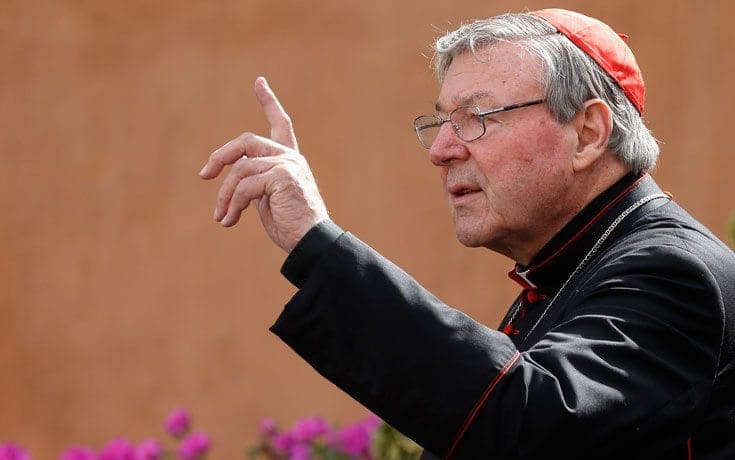ROME — Pope Francis decided the future of his financial reform on Tuesday, issuing a new legal framework for three key oversight bodies that largely confirm the authority of the man he put in charge of his clean-up operation, controversial Australian Cardinal George Pell.
The decision came in the form of a new legal framework approved by the pontiff for the Vatican’s three financial oversight bodies that he created in 2014: The Council for the Economy, the Secretariat for the Economy, and an independent auditor general.
Despite mounting calls from some quarters of the Vatican to rein in Pell, such measures are largely missing from the new statutes, which were signed by Pope Francis on Feb. 22 and became effective March 1.
The only major concession is that while the Secretariat for the Economy has been confirmed as responsible for procurement and personnel, it will not administer Vatican real estate. That function, which had been assigned to Pell’s department last year, will be returned to another Vatican department.
In general, the results are likely to be taken as a show of confidence in Pell at a time when the 73-year-old prelate had found himself under mounting fire.
Since his arrival in Rome one year ago, Pell had ruffled feathers by moving aggressively to implement new transparency and accountability measures, including publicly disclosing the presence of assets that he claimed had previously been hidden by various departments.
His campaign bred blowback, most recently in the form of leaked receipts in the Italian media purporting to show that Pell’s office had racked up more than a half million dollars in expenses during its first six months of existence alone, including a tab of more than $3,000 at a famed clerical tailor shop in Rome.
As the preparation of a legal framework unfolded, some veteran Vatican insiders saw it as an opportunity to impose new checks and balances on Pell and his Secretariat for the Economy.
Italian Cardinal Francesco Coccopalmerio, head of the Pontifical Council for Legislative Texts, made a series of suggestions to the pontiff. They included:
- Creating a new four- or five-member council of cardinals to oversee Pell’s activity
- Limiting the role of lay experts, many of whom presently are Pell allies
- Watering down the extent to which the Vatican’s major financial players, such as the government of the Vatican City State, fall under the oversight of the Secretariat for the Economy.
In the main, Francis did not take up those suggestions, choosing instead to leave the powers and scope of the new entities largely as they were envisioned one year ago.
The Council for the Economy is a 15 member-body, 8 of whom are cardinals and 7 are lay experts with background in law, economic, administration, or other matters falling within the activities of the Council.
With equal voting rights, the prelates and the lay experts are responsible for the Vatican’s overall policy. US Cardinal Daniel DiNardo, archbishop of Galveston-Houston in Texas, is the lone American on the council.
The Secretariat for the Economy under Pell is responsible for day-to-day management, reporting to the Council for the Economy. The new statutes recognize its division into two sections.
One supervises the budgets and the management of human and financial resources entrusted to the departments of the Roman Curia, meaning the Vatican’s administrative bureaucracy. The second, an administrative section, handles both purchasing and personnel, “in accordance with appropriate internal controls and procedures.”
The third component of Francis’ new oversight bodies is an “independent and autonomous” auditor general’s office, which will have a director and two auditors. The office will review the financial statements of Vatican departments following “the best international practices of public administration.”
According to the statutes, the auditor general can request any information from either the council or the secretariat and from the various Vatican offices.
If there are reasons to suspect that funds, goods, activities, initiatives, or economic transactions are connected to money laundering or funding terrorism, the auditor general will present a report to the Financial Information Authority, or AIF, which is the Vatican’s anti-money laundering agency.
Sources told Crux in late February that the hiring process to fill that position was underway.
All three departments have both English and Italian as official working languages, something uncommon in the Vatican where Italian is typically the norm. The idea is to expand the talent pool by allowing the oversight bodies to tap international financial expertise.
In recent days, the Vatican has tried to mount a defense of Pell in advance of the issuance of the statutes.
The Vatican spokesman, the Rev. Federico Lombardi, called the leaking of the receipts “illegal” and described the attacks on Pell as “undignified and petty,” adding that the work of reform under Pell is proceeding with “continuity and efficacy.”
“The fact that complex economic or legal issues are the subject of discussion and diverse points of view should be considered normal,” Lombardi said, trying to play down internal differences of opinion.
In its own statement, the Secretariat for the Economy said that expenses over the past year been below a budget set when it was established in March 2014, and included the salary of the 12 employees working for the department.
It said the expenses at Gammarelli’s, a clerical tailor shop in downtown Rome, were for a small chapel inside the Secretariat. Since the chapel wasn’t previously in use, it said, there were no vestments for celebrating Mass.















